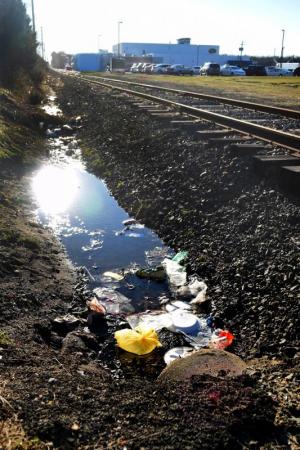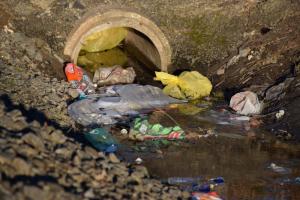It was a March day in 1974 when a younger Bob Lawson pulled up his waist-high waders and plowed through the debris choking Beaverdam Creek.
Lawson was joined by his Harbeson neighbor, Bud Wagner, and several other nearby residents who were concerned that the debris piling up in the creek would cause trouble as stormwater and wastewater from a nearby chicken plant, then owned by Paramount Poultry, flowed through the blocked creek on its way to the Broadkill River.
For two months the men cleared debris to open up the stream's flow. Around the same time, they had formed the Harbeson Improvement Association to address quality of life concerns raised by business practices at the plant. But then, locally owned Allen Family Foods took over, continued cleaning up and became good neighbors, Lawson said.
Fast-forward 40 years, and Lawson and Wagner are seeing the same problems return. A new company, but an old story, they say.
“Out of my 70 years here, this is the worst I've ever seen it,” Lawson said. “I can remember seeing life in this creek. It doesn't exist anymore.”
That is before production at the plant increases from 1.1 million to 1.8 million chickens per week later this year and after state officials approved more than $11 million in state-issued loans for the private company to upgrade its wastewater treatment system.
On a March day in 2016, Lawson walks along the railroad tracks that run beside the Harbeson poultry plant, now owned by Allen Harim LLC. He watches as trash turns into tumbleweeds, blowing from the parking lot, beside the tracks, across Route 5 and onto his Century Farm property.
But that's not the only problem neighbors have with Allen Harim's Harbeson plant, which will soon become the company's main Delaware processing plant after abandoning plans to produce chickens in Millsboro and deciding to shutter a 75-year-old facility in Cordova, Md.
Lawson joined about 100 local residents, environmental officials and Allen Harim representatives at the Milton Fire Department April 25 to address recently issued permits and quality of life concerns from trash and traffic to odor and noise.
“As soon as Harim of Korea bought the plant, things started to slide backwards until today. The town has been set back to the 1974 standards,” Lawson said. “I am a farmer, and we live and have laws, rules and regulations set up by the state of Delaware. If I abuse these laws, the way Allen Harim is doing, I would be fined and put out of business. Where is DNREC?”
There have been at least three community meetings since the state Department of Natural Resources and Environmental Control issued a renewed National Pollutant Discharge Elimination System permit, or NPDES permit, effective February 2016, that allows Allen Harim's Harbeson plant to discharge up to 2 million gallons per day of treated wastewater and stormwater to Beaverdam Creek. The new 5-year permit allows for an increase in water discharge, but decreases most pollutant caps; total nitrogen will be decreased by more than 80 percent, but the company has been given a 42-month compliance schedule to meet that new requirement.
Allen Harim CEO Steve Evans said in previous interviews that a $35 million investment at Harbeson includes upgrades to restrooms, the cafeteria, shipping and receiving, production lines, equipment, wastewater treatment and the addition of a water-reuse system. State officials approved the first phase of construction earlier this year.
At each meeting, Maria Payan of the Socially Responsible Agriculture Project slams DNREC and Allen Harim on details included in environmental assessment reports, violations that have been found only through Freedom of Information Act requests, and why DNREC officials failed to renew the NPDES permit when it expired in 2011.
At the April 25 meeting, Payan threatened a possible injunction, pointing out a portion of a report submitted to DNREC's Financial Assistance Branch and Water Infrastructure Advisory Council included typos that referenced a Pennsylvania-based poultry plant instead of the Harbeson site. That document was one of the first steps in an application process that led to the approval of state-administered loans to upgrade the facility's wastewater treatment system. The approval marked the first time the council provided low-interest Clean Water State Revolving Fund loans to a private company.
“So while you're talking about your workers and appealing your OSHA violations, by the way, these workers and those residential communities on three sides of this facility have not seen one soil, water or air sample,” Payan said. “You are threatening everyone in this room as well as all your employees. This is how Superfund sites start.”
Allen Harim has contested several violations and $38,000 in fines after a recent U.S. Occupational Safety and Health Administration investigation alleged workers at the company's Harbeson plant were performing tasks without proper injury-prevention practices.
However, Evans said his company strives to take care of its employees and also be a good neighbor.
“I want to stop all of the misinformation,” Evans said at the beginning of the meeting. He quoted his company's strategic plan, which calls for plant upgrades as the company centralizes processing operations in Harbeson.
“We've contracted a third-party company who's going to clean that parking lot every day,” he said, addressing Lawson's concerns about trash spreading from the plant parking lot to nearby properties. “On traffic, there's no doubt. We're working with DelDOT. … We're making sure we meet the new guidelines the EPA has put on the state.”
Public hearing set for June 9
A public hearing regarding Allen Harim's application for Phase 2 construction at the Harbeson plant has been scheduled from 6 p.m., Thursday, June 9, at the Milton Public Library at 121 Union St.
The Phase 2 construction permit application includes the new water-reuse system. Company officials have estimated the reuse system and other upgrades will decrease total nitrogen loads in discharged water from 46 milligrams per liter to 4 milligrams per liter and decrease total phosphorous loads from 5 milligrams per liter to 0.3 milligrams per liter per day. The reuse system had been touted to recycle up to 1 million gallons per day of wastewater generated in poultry processing.




























































